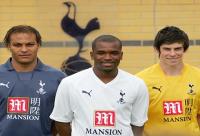
Experiencing a top-flight football match in all its unencumbered glory is very different to the good old days. Pies have been replaced with prawn sandwiches. Ale replaced with Lager. Standing replaced with the best polymers backside accomodators that money can buy. Traditional stadiums making way for identikit extravaganzas of corporate joy. Sponsorship trends are no exception to the generally unwritten rule of change. Have they changed for the better though?
You have to cast your mind back to 1979 for the first time a company dared put a brand on a shirt. Liverpool’s famous red shirt carried the word Hitachi on the front. Most fans likely wondered whether for some reason the club had sewn the name of their latest Eastern Europe bulldozing centre-forward on the wrong side of the shirt.
The 1980s saw a trend that meant most sides in the upper echelons of the Football League had realized sponsorship was a revenue stream they couldn’t do without. It escalated during the 90s and then the last decade saw it reach fever pitch with deals being struck for insanely exorbitant amounts of money.
The gaming industry had been on the periphery until a deal signed between Mansion and Tottenham Hotspur in 2006 blew almost everyone else out of the water. The four-year deal worth £34million was, at the time, third to only Manchester United and Chelsea in size. It created a co-branded Internet gaming venture between the two and was a precursor to where we find ourselves now.
Both Mansion and Tottenham Hotspur declined to comment on why the deal was terminated a year early in 2009 with rumors the venture didn’t bring enough business to the casino’s website. With no comment from them two we asked a fan that follows the side all over Europe what he thought.
When asked why Mansion might have pulled out, James Ilsley, who has followed the side as far as Milan and Madrid over the past year, said: “I think it was the people within the hierarchy of the club that only had a Mansion on a set contract and owners ENIC saw more promise and more importantly more money with a different sponsor. I don’t think it was a case of Mansion pulling out but Spurs looking at more profitable ways to improve the club.”
Debate over money is never far where sponsorship is involved and it wouldn’t be surprising if Spurs had plumped for the wonga. Asia gaining more traction than ever before meant the short-term decision to terminate this contract could be a short-sighted one. Either way, Ilsley believes that firms from the gambling industry’s largest market have a bigger problem to contend with.
“They aren’t taken seriously enough by the modern day fan which is due to a number of reasons, one being they’re an unknown quantity. British people don’t like change and are reluctant to make an effort to engage in things that don’t look like we want it to look,” he said.

Fans in the stadiums aren’t the ones Asian firms at looking at though. Deals being signed left right and centre may, in the eyes of fans in this country, detract from the matchday experience. The same is likely to have been said way back in 1979 when Liverpool signed the first deal of its kind. There’s no feeling that soccer has simply sold out to the highest bidder. As sponsors go there aren’t many other industries that have the amount of links with football as bookies do. Involvement from Asia is a logical next step as that’s where the biggest growth for both football and gambling is being experienced.
The trend of the long-term deal signed by bookmakers might be long gone. It’s done nothing to affect more deals being signed – if only on a short-term basis. Bodog’s deal with West Bromwich Albion is only a year. Deals signed by Wigan and Bolton are short and they’ve all clearly learned from where Mansion slipped up.
Supporters are always going to be more bothered about rivalries with other clubs than, something illustrated by Ilsley’s closing repost: “I had no problem being sponsored by Mansion. The only thing that bothered me was the fact it was red.”
